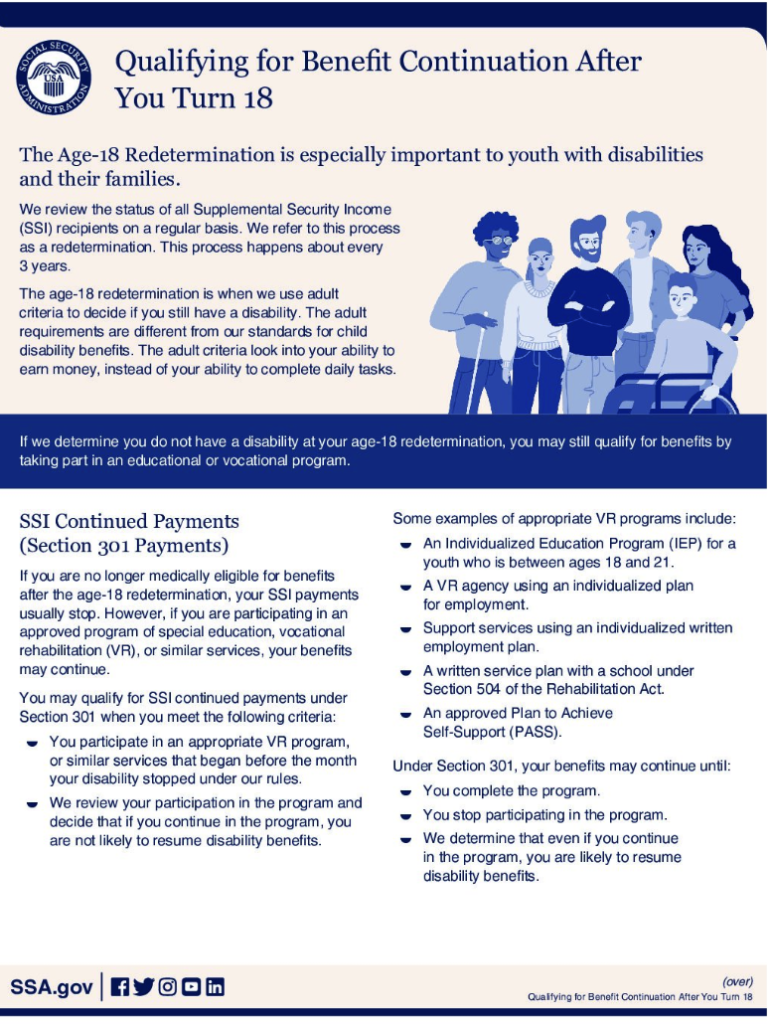When your child reaches the age of 18, they legally become an adult. This milestone is a crucial moment to think about their financial future, particularly if they require ongoing care into adulthood.
We have compiled some important resources for you to understand how the SSA system works and prepare for this important milestone in your child’s life. In this post, you will find:
- 5 Things to Know When Your Child with Disabilities Turns 18
- Age 18 Redetermination
- SSI Youth Toolkit 2023
- What You Need To Know About Your Supplemental Security Income (SSI) When You Turn 18
5 Things to Know When Your Child with Disabilities Turns 18
This article on the SSA.gov blog provides guidance for parents and guardians of young adults with disabilities as they transition to adulthood at 18. Key considerations include:
- Health and Welfare Decision-making: Parents may need to appoint a Representative Payee or seek guardianship to continue assisting with decisions. More information is available on Social Security’s website.
- SSI Eligibility Changes: Eligibility for Supplemental Security Income (SSI) is reassessed using adult criteria at age 18. Resources are provided for understanding these changes.
- Education Transitions: Options include pursuing a diploma, certificate, or employment, with support from Individualized Education Programs (IEPs) and Vocational Rehabilitation Services.
- Support for Living Arrangements: Transitioning out of school may change access to therapy and respite services. Families should explore available benefits and services.
- Financial Protections: Establishing a Special Needs Trust and ABLE Account can protect benefits and financial resources. Young adults may continue receiving benefits under specific conditions.
The article emphasizes planning for these transitions to ensure the young adult’s continued support and financial security.
Age 18 Redetermination
When young people who have been receiving SSI benefits as children turn 18, they must undergo a reevaluation to assess whether they meet the Social Security Administration’s medical and nonmedical eligibility criteria for adults. This process, known as “redetermination,” is crucial for determining if they will continue to receive SSI support into adulthood.
This article provided by SAMHSA (Substance Abuse and Mental Health Services Administration) walks us through the essentials of this experience, digging into some of the important details necessary to understand the process including:
SSA’s Definitions of Disability: Child vs. Adult
The differences between a Child versus an Adult Due as defined here require an age 18 redetermination and is a medical decision based on adult standards since 2018.
4 Steps for the Age 18 Redetermination Process
- Written Notification
- Interview
- Medical Eligibility
- Notice of Decision
Section 301 Status:
- this is when benefits continue even though the 18 year old is deemed ineligible.
- Filing an Appeal – this must happen within 10 days of the redetermination notice, so act quick.
This article is embedded with many important and beneficial links to support your education in this area so we strongly encourage you to click through the link above and read more.
SSI Youth Toolkit 2023
The Age-18 Redetermination is particularly significant for youth with disabilities and their families. We regularly review the status of all Supplemental Security Income (SSI) recipients, a process called redetermination, which occurs approximately every three years. During the age-18 redetermination, we use adult criteria to determine if the individual still qualifies as having a disability. Unlike the criteria for child disability benefits, the adult criteria focus on the individual’s capacity to earn income rather than their ability to perform daily activities.
This 2 page PDF information leaflet titled “Qualifying for Benefit Continuation After You Turn 18” includes a quick reference guide specifically focused on the Age 18 Redetermination process and the Section 301 Payments. This document will refer you to the brochure listed below for more details.
“For additional information, read What you Need To Know About Your Supplemental Security Income (SSI) When You Turn 18 (Publication No. 05-11005) online at www.ssa.gov/pubs/EN-05-11005.pdf.“
What You Need To Know About Your Supplemental Security Income (SSI) When You Turn 18
This is a very helpful and simple PDF Brochure that you can download, print and share with your support team as you prepare for your child’s transition into adulthood as it relates to your Social Security Disability benefits for yourself and your child.
This brochure includes the essentials for your Supplemental Security Income (SSI) when you or your child turn 18.
Age-18 Redetermination, Earnings, Work Incentives & Supports:
- The Age-18 Redetermination
- Earnings & The Age-19 Redetermination
- Social Security Work Incentives and Supports
- Continued Payments (Section 301 Payments)
- Student Earned Income Exclusion (SEIE)
- Programs to Achieve Self-Support (PASS)
- Work Incentives Planning and Assistance (WIPA)
- Protection and Advocacy for Beneficiaries of Social Security (PABSS)
- Grants and Scholarships
- Achieving a Better Life Experience (ABLE) Account
- National & Community Supports from Programs Other Than Social Security
If it does not appear in a new screen, please check your downloads folder.
As a recap and to conclude this article, here is an excerpt from the SSA.gov blog post mentioned above:
Children receiving benefits on a parent’s record may continue to receive those benefits until age 19 if they’re a full-time elementary or secondary school student. People who have a qualifying disability that began before age 22 may also be eligible to receive child’s benefits at any age. For more information, please review the publication, Benefits for Children.
As your child turns 18, consider these issues while you navigate their financial future. For more information, please visit the Social Security website and contact the Special Needs Alliance.




